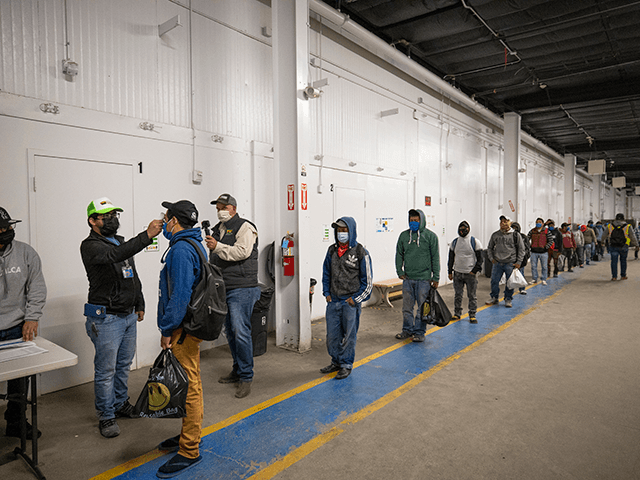GOP legislators deserve credit for blocking most of the Democrats’ migration-expansion spending plans in the 2022 appropriations bill, says Rob Law, regulatory affairs chief at the Center for Immigration Studies.
“For once, the Republican Party on the immigration issue has really stood strong and firm,” said Law. “This is the best-case scenario.”
Business-backed pro-migration groups declared disappointment that they did not get extra taxpayer money to bring even more wage-cutting migrants into Americans’ workplaces and society.
The appropriations bill is a “huge disappointment,” tweeted Gregory Chen, the government relations for the American Immigration Lawyers Association, whose members make money by delivering consumers and workers into the U.S. economy.
“Reads like a Trump-era bill,” lamented Heidi Altman, policy director at the Chicago-based National Immigrant Justice Center.” The bill provides “funding for ICE detention … More deaths, more families separated, more pain, all needless,” she tweeted.
The bill is “Congress’ blatant attempt to conceal and quickly pass a bill that continues funding the violence of immigration enforcement at obscene levels, all while hoping to evade public scrutiny and backlash,” according to a business-backed coalition of progressive pro-migration groups. The coalition describes itself as the “Defund Hate Coalition.”

CASA, an advocacy organization for Latino and immigrant people and other immigrant advocacy groups rally outside the White House to demand that the Biden administration take action on citizenship for all on May 26, 2021 in Washington, DC (MANDEL NGAN/AFP via Getty).
The complaints, however, come as Presiden Joe Biden’s pro-migration deputies are using their power within the agencies to import record levels of job-seeking, wage-cutting economic migrants, and record numbers of visa workers for blue-collar jobs and Fortune 500 white-collar jobs.
The spending bill was negotiated by the GOP’s legislators on the House and Senate appropriations committee and their various sub-panels.
For example, the homeland defense spending was negotiated by GOP Sen. Shelley More Capito (R-WV) and Rep. Chuck Fleischmann (R-TN). The GOP legislators were greatly aided by the GOP’s ability to block spending bills from getting through the Senate.
The GOP members who are on the committees include several legislators who have often supported more labor migration for CEOs instead of higher wages for working Americans.
The GOP legislators blocked Democrats’ plans to pull more Afghan migrants into Americans’ society, to provide taxpayer-funded lawyers for illegal economic migrants, and to issue more green cards to U.S-based, white-collar contract workers who took jobs from U.S. graduates.
They blocked Democrats ‘ plans to cut funding for immigration enforcement, and to take back prior spending on the border wall, he said.
The UN is giving cash to migrants trekking up through South America and Mexico, says Todd Bensman at the Center for Immigration Studies. https://t.co/1FBsp2dJWN
— Breitbart News (@BreitbartNews) January 19, 2022
“You want to be careful to not overdo the praise, but certainly, I’d say any Republican that was involved in the negotiating deserves applause,” Law said.
“A lot of that would have to go to your rank and file members that said that ‘These are sticking points and I’m not going to vote for this [bill] in the absence of these things,'” he added.
“I guess the Democrats decided that cutting all those loose [from the bill] was worth it to avoid being responsible for shutting down the government,” Law said.
But it is also true that the Democrats blocked funding for many of the GOP’s popular pro-American immigration policies, he said. “The worst thing that you see is what’s not there,” he said.
The bill does not include GOP rules barring the funding of the Democrats’ loose-enforcement rules, does not bar the inflow of more visa workers, does not dent funding ti pro-migration non-profits, and it does not penalize officials for not completing the border wall — even as it does fund border walls in several other countries, he said.
The Democrats’ opposition to potential GOP curbs ensures that President Joe Biden’s pro-migration border chief will continue to use his bureaucratic powers and his regulatory powers to open more border doorways for more economic migrants. Some of those doorways may be closed by lawsuits in federal courts.
And the Democrats did win some of their priorities. They got $275 million to help accelerate the conversion of economic migrants into citizens, plus more money to bring more Afghans into the U.S. on so-called “humanitarian parole” and Special Immigrant Visas (SIVs). The bill also funds border security for eight other countries,
One million migrants have crossed the border since October, according to a June 29 report by CNN. https://t.co/E1N4UjOKeK
— Breitbart News (@BreitbartNews) July 2, 2021
The bill also restarts the bipartisan EB-5 “Golden Visa” program, which cheaply sells U.S. citizenship to wealthy foreigners who help favored business groups. The EB-5 revival, however, includes major reforms sought by Sen. Chuck Grassley (R-IA).
Legislators from both parties also cooperated to double the annual inflow of roughly 66,000 H-2B visa workers for landscapers, restaurants, hotels, amusement parks, and ski resorts. That giveaway will reverse the job-and-wage gains enjoyed by many Americans after President Donald Trump blocked the inflow of the summer visa-workers in 2020 and 2021.
“It’s a never-ending assault on the lower-skilled Americans having an opportunity to meaningfully participate in our economy,” Law said. “They’re suffering disproportionately as inflation is raging out of control, and now they’re basically all but assured that they’ll be even more foreign [H-2B] workers to compete with as we roll into the spring and summer.”
But, overall, the bill “is really impressive and I think it just goes to show that if you actually have a Republican Party that makes immigration a focal point and holds their ground, there’s just not there’s not the legislative support to get this [pro-migration] stuff through. Despite all the talking points [from lobbies and media outlets] that there’s broad bipartisan support, it is obviously not there.”
Since at least 1990, the D.C. establishment has used a wide variety of excuses and explanations to justify its policy of extracting tens of millions of migrants and visa workers from poor countries to serve as workers, consumers, and renters for U.S investors and CEOs.

Migrant farm laborers with Fresh Harvest working with an H-2A visa have their temperature checked and are asked questions about their health before boarding the bus to their shift, in the company living quarters in King City, California. (Brent Stirton/Getty Images)
The economic strategy of extraction migration has no stopping point, and it is harmful to ordinary Americans because it cuts their career opportunities and their wages while also raising their housing costs.
Extraction migration also curbs Americans’ productivity, shrinks their political clout, and widens the regional wealth gaps between the Democrats’ coastal states and the Republicans’ heartland states.
An economy built on extraction migration also radicalizes Americans’ democratic, compromise-promoting civic culture and allows wealthy elites to ignore despairing Americans at the bottom of society. Migration is also backed by ambitious university progressives who desire to exploit the chaos of a diverse society rather than playing a subsidiary role to cooperating citizens in a democratic republic.
The economic strategy also kills many migrants, violates workplace standards, separates families, and extracts wealth from the home countries.
Unsurprisingly, the wealth-shifting extraction migration policy is very unpopular, according to a wide variety of polls.
The polls show deep and broad public opposition to labor migration and the inflow of temporary contract workers into jobs sought by young U.S. graduates.
The opposition is growing, anti-establishment, multiracial, cross-sex, non-racist, class-based, bipartisan, rational, persistent, and recognizes the solidarity that Americans owe to one another.

COMMENTS
Please let us know if you're having issues with commenting.